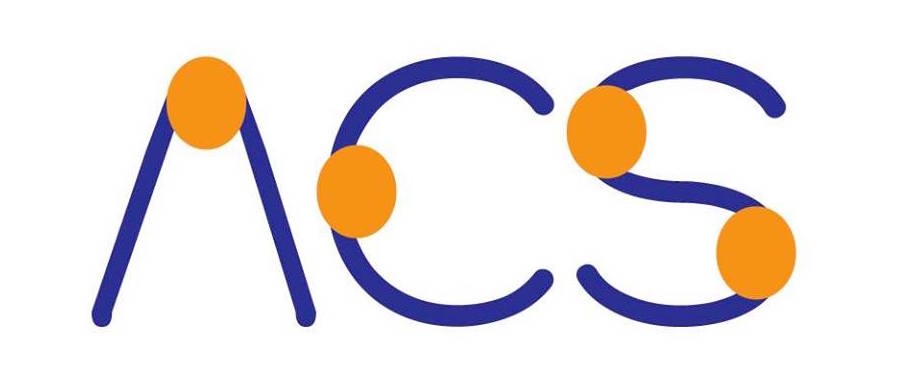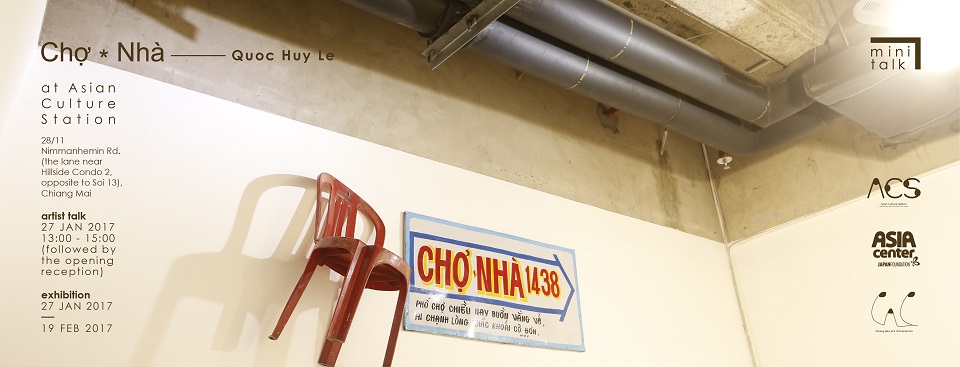นิทรรศการ 【 Chợ * Nhà 】
ศิลปิน: Le Quoc Huy
ระยะเวลาจัดแสดง: 27 มกราคม 2560 – 19 กุมภาพันธ์ 2560
เปิดนิทรรศการ: 27 มกราคม 2560 โดยมีการบรรยายของศิลปิน ตั้งแต่เวลา 13:00 น. และตามมาด้วยงานเปิด
สถานที่: Asian Culture Station
Asian Culture Station ขอเชิญชวนคุณมาสัมผัสชีวิตผ
Chợ แปลว่า ตลาด และ Nhà แปลว่า บ้าน นิทรรศการนี้ได้ถ่ายทอดโครง
ประเทศเวียดนามถูกฉีกเป็นเห
ปัจจุบันนี้ในใจกลางนครแทบจ
นิทรรศการนี้เป็นส่วนหนึ่งข
สอบถามรายละเอียดเพิ่มเติมไ
Asian Culture Station
ที่อยู่: 28/11 ถ.นิมมานเหมินท์ (ซอยข้างคอนโดฮิลล์ไซด์ 2 ตรงข้ามซอย 13) ต.สุเทพ อ.เมือง จ.เชียงใหม่ 50200
อีเมล: [email protected]
เบอร์โทรศัพท์: 053 222 324
เฟซบุ๊ค: Asian Culture Station
เว็บไซต์: http://
– – – – – – – – – –
【 Chợ * Nhà 】
This exhibition is a part of Mini Shows Project
Artist: Le Quoc Huy
Exhibition period: 27 January 2017 – 19 February 2017
Opening: 27 January 2017, featuring the lecture by the artist from 13:00 onwards, followed by the opening reception
Venue: Asian Culture Station
Asian Culture Station would like to cordially invite you to experience life through the art of typography and a unique touch of Vietnam’s urban society in an exhibition entitled “Chợ * Nhà” by Le Quoc Huy, a Vietnamese designer behind “The Lost Type Vietnam” project. He has been conducting an inquiry into the root and utilization of Vietnamese typography by exploring the highly dynamic nature of Ho Chi Minh City and meticulously capturing details of the relationship between typography and the locals’ everyday life.
In Vietnamese, Chợ means ‘market’ and Nhà is a word for ‘home’. This exhibition tells the story of one of the artist’s small projects in which he surveyed Chợ Binh Tay, an old wet market adorned in the Sino-French Architecture in the suburban Chinatown. This wet market bears many resemblances to Kad Luang (Warorot Market) in Chiang Mai. As much as being typically messy, dirty, and crowded, this wet market has a longstanding close ties to the city residents. There he found letters on the hand-painted signs that had been there since the pre-war period, illustrating the typefaces that are rarely found in the present day. Thus, he recorded the stories behind these signs and shops in this market in the form of a commonly uncommon notebook
Vietnam was divided into North and South Vietnam since the country won its independence from France. Ho Chi Minh City (formerly known as Saigon and its surrounding cities) became a center of Southern Vietnam which chose to adopt capitalism as opposed to a communist Northern Vietnam. The war between these two lasted for almost 20 years, resulting in the death and displacement of millions of civilians while disastrously disrupting the country’s socioeconomic development. It took the country more than 20 years to recover after the national reunification, turning Vietnam into a wealthy country with one of the highest economic growth rate in the world. Ho Chi Minh City has successfully revived its capitalist economy from the history. It has turned into a modern metropolis with skyscrapers and luxurious stores, while slowly losing the grasp on social history together with the memory of its bitter past.
Currently, wet markets are scarce in the city center. Even Chợ Binh Tay is going to disappear from Ho Chi Minh City, making way for modern commercial development. Therefore, Chợ * Nhà is not merely about simple letters on hand-painted signs, but the stories of those hands that painted these typefaces which provide a point of revival for nearly half a century of history in order to reinforce a stronger culture.
This exhibition is part of the mini-exhibition project which invites artists or creatives within Southeast Asia and Japan to create a conversation with Asian Culture Station through a public exhibition. This project aims to explore the variety of space utilization and foster relationship as well as cooperation between the local and creative communities. For this exhibition in Chiang Mai, ACS has asked the artist to create a special version of his show held in Vietnam. The exhibition will take place from 27 January 2017 to 19 February 2017 at Asian Culture Station, Nimmanhaemin Road Soi 8 (next to Hill Side 2 Condominium), Chiang Mai, Thailand. The launch of this exhibition also features the lecture on “The Lost Type Vietnam” project by the artist.
For more information:
Asian Culture Station
Address: 28/11 Nimmanhaemin Rd. (the lane near Hillside Condo 2, opposite to Soi 13), Suthep, Muang, Chiang Mai
Email: [email protected]
Phone: 053 222 324
Facebook: Asian Culture Station
Website: http://
Asian Culture Station

